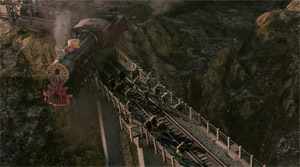

Tie dao fei hu
China 2016
Genre:
Action, Comedy
Director:
Ding Sheng
Cast:
Jackie Chan
Huang Zitao
Wang Kai
Darren Wang
Jaycee Chan
Xu Fan
Hiroyuki Ikeuchi
Zhang Lanxin
Sang Ping

Railroad Tigers

Story: Ma Yuan (Jackie Chan) is the leader of the Railroad Tigers, a group of Chinese freedom fighters who during the Second Sino-Japanese
war offer resistance to the Japanese by robbing trains and stealing guns. However, the group isn't professenially trained in any way and among others consists
of the hammer-swinging Rui Ge (Jaycee Chan) and Da Hai (Huang Zitao). One day a badly hurt soldier of the Eight Route Army turns up at the freedom fighters' door.
He tells them that he is the only survivor of his unit and that it's vital in the war against the Japanese to destroy a nearby bridge within the next four
days. Since the army can't be brought in in time Ma Yuan and his group want to undertake the mission. For this they need a good amount of explosives, though.
But stealing it doesn't go as smoothly as expected and so the captain of the Japanese military police force, Yamaguchi (Hiroyuki Ikeuchi), is hot on their
trails. Ma Yuan and his people have been smiled at for their little insurgencies, but now they have the chance to accomplish something big. For his they
are willing to risk quite a lot.





Review: First, I was a little bit irritated why "Railroad Tigers" received so many bad or at least mixed reviews. Sure, it is an action flick
in which Jackie Chan doesn't showcase his martial arts prowess, but this certainly doesn't come as a surprise since first, Chan doesn't get any younger and
second, he wanted to appear in roles a bit different from his usual ones for quite a while already. But the more the movie progresses the clearer the movie's
weaknesses become apparent. The biggest one being an uneven tone which dances somewhere between slapstick and cruel anti-war movie. This is extremely
irritating and at times even diminishes the rather high entertainment value of the flick. Director Ding Sheng shouldn't necessarily have approached the
story with extreme sensitiveness, but the historical setting of China's efforts obtaining freedom during the year 1941 actually would have deserved
some more elaborate writing.

The frame story, if you actually want to call it that, is completely unnecessary, too. It shows a little child gazing into the fire of a locomotive furnace
whereas the rest of the flick is told as a flashback. At least this way the filmmakers were able to throw in an unneeded cameo appearance by a famous
actor, who we get to see in every other production from Hong Kong or China anyway. The title screens which with each chapter inform us about what
we need to expect in the next few minutes are absurd as well. It's a redundant stylistic device since the plot doesn't really demand serious attention to
detail. Adding to this is a comic-like introduction of the characters in the beginning. The tone is clearly supposed to be pushed in the direction of
easy to digest entertainment.

In the beginning of the film you actually get the feeling of watching a typical heist flick, whereas it's not a modern day bank that is robbed, but a train.
Well-elaborated plans and perfect timing are crucial and so it soon becomes obvious that our heroes may not have had special training,
but still stand as a pretty professional team. But then the inhumanity of the Japanese comes into play, which nonetheless is every now and then lightened up
by some moments of slapstick. With so much evilness in the villains it probably won't bother anyone if the Japanese are taken out in droves by the Railroad
Tigers during their missions, right? After all, it's World War II and China fights evil Japan! But that's actually where a big breach in tone becomes apparent
in the flick, which runs through the whole movie.

Director Ding Sheng has already worked with Chan in "Police Story 2013" among others and he also delivered a neat thriller
with "Saving Mr. Wu". However, what he presents here often causes frowns. Oftentimes, you don't know whether you are
supposed to laugh or cry. The movie frequently takes its time to implement one or two jokes and at times they are sadly lost in translation. Moreover, the
cordial, family-like relationship within the group is stressed on several occasions. Yet, the Japanese get their necks broken, are locked inside a train
wagon and cold-heartedly shot down or the war is shown in all of its disastrousness during one or two skirmishes. There is even the issue tackled what it means
to sacrifice something for your freedom. But you can't really take this serious with all the fun involved. And you can't really laugh with
all the seriousness involved either.





The characters are merely caricatures, so that not even Jaycee Chan ("Invisible Target"), Jackie Chan's son, gets a lot to do. At least, there is the action and while we get quite a few green-screen shots in the beginning, the last third is quite impressive with its fantasic train setpiece. There are quite a few nice ideas come up with and so the train in fact becomes the movie's actual star. Adventure feeling kicks in, the momentum of a moving train is conveyed well and the explosions give the events on screen the necessary oomph. This may also make you forget the script's problems and the issue with the uneven tone, just allowing you to be well entertained. Accordingly, I was surprised how well I liked "Railroad Tigers" in the end. Maybe my expectations were subdued. However, it's true that you have to be willing to deal with an uneven tone and even then it will leave a bad aftertaste. What a shame.

Disclaimer










